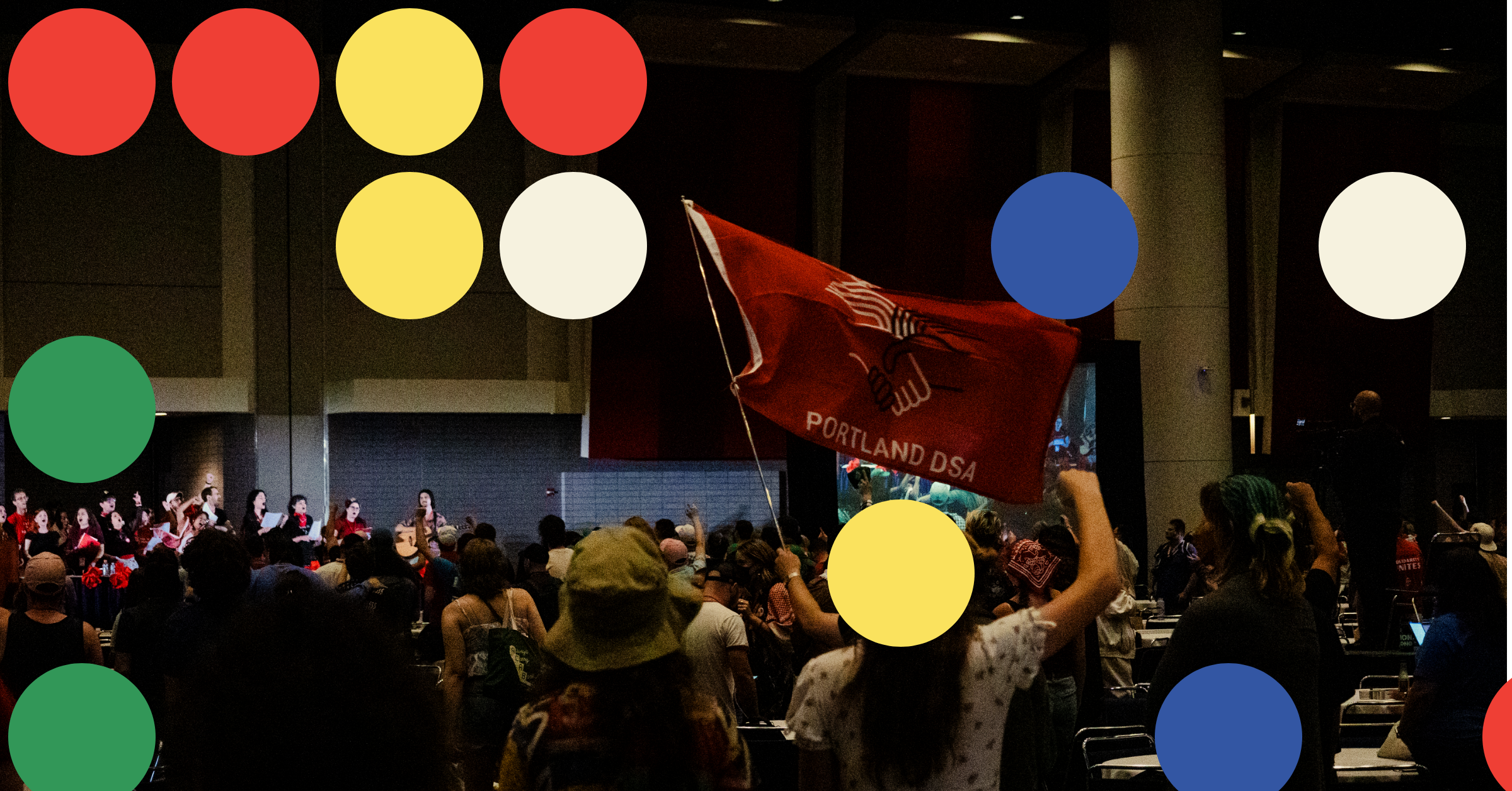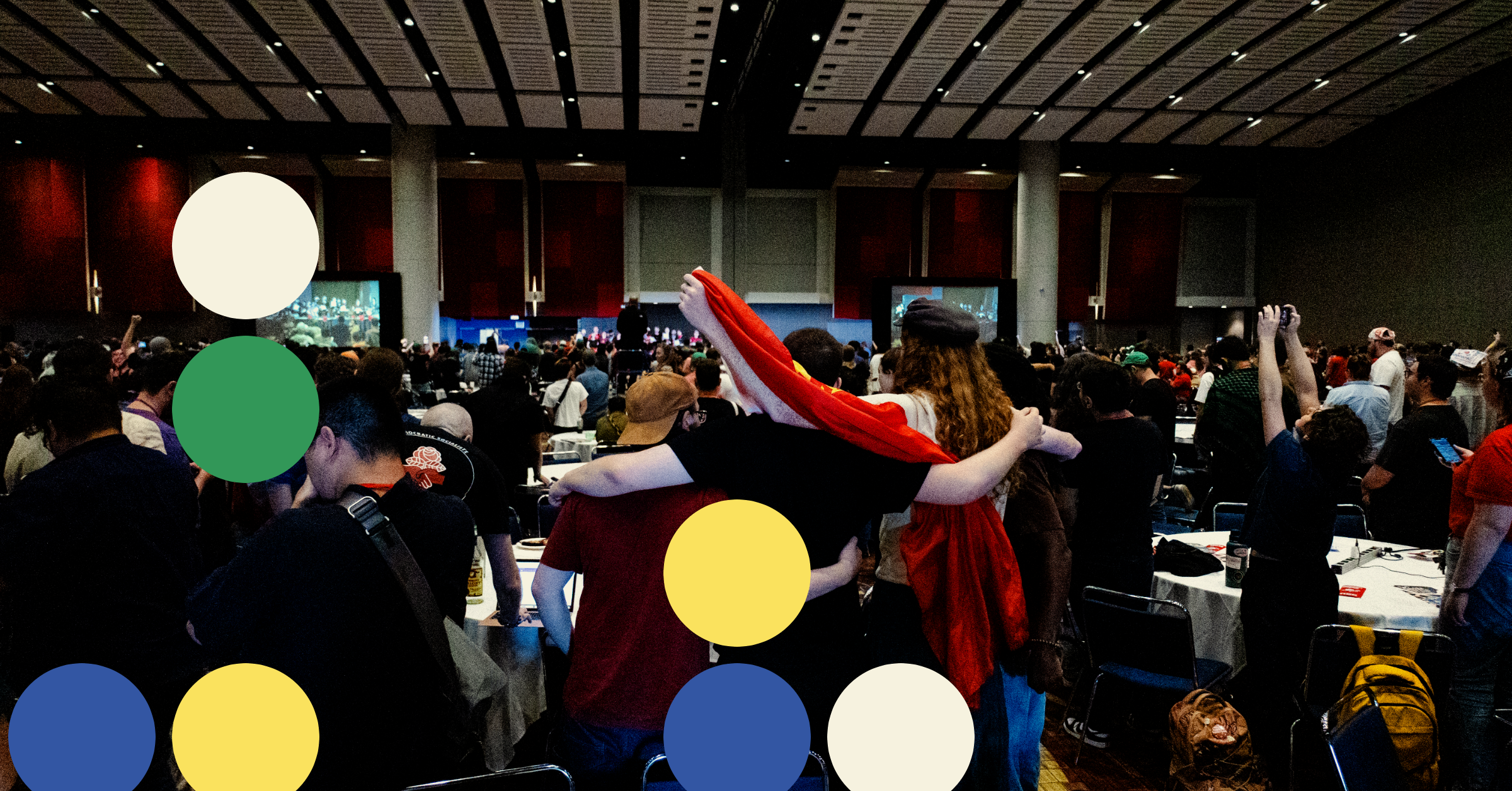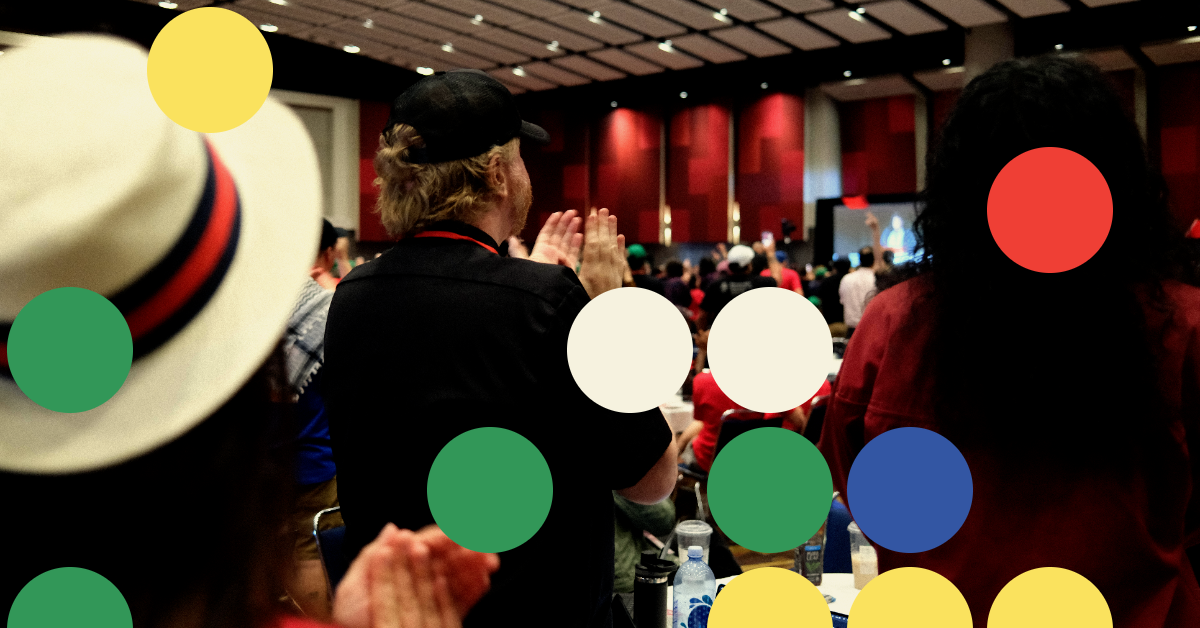At our 2023 convention, just under a thousand delegates chose three giant steps forward for DSA: toward a more independent, agitational electoral strategy; toward building rank-and-file power in the labor movement; and toward an open, growing member democracy.
Adrift after the clarity and ambition of the Bernie years had passed, and coming out of a four-year gap without an in-person convention at which to strategize and connect, it wasn’t clear what sort of organization delegates to the convention would want DSA to be.
Instead of retreating into trenches by project and tendency, supermajorities chose to build bridges across our politics. More than ever before, those bridges connect our immediate organizing with a socialist horizon.
Delivering on this promising strategy will take commitments of time, money, and good faith from across DSA. And we don’t have illusions that change will happen overnight. DSA is a raucous democratic organization. There will still be feuds and fumbles. Leaders will come and go. But at least now we can see a path opening up to a more stable and mature future. With more political cohesion and ambition than any convention before, DSA bounced back from three difficult years with three strides ahead.
Acting Like an Independent Party
In past years, DSA debates about electoral strategy included the open question of whether DSA should fight on the terrain of the state at all.
With that question now settled (“yes”), we could finally start to ask, what kind of electoral organization does DSA want to be? Are we ready to build the foundation of an independent party whose priority is growing a movement of working people to end capitalist power for good?
By adopting a series of amendments to the National Electoral Committee (NEC) base resolution, delegates proved DSA has a surprisingly stark majority for that project. This is a big step forward from the divisions of the past.
Members across DSA have increasingly started framing their goals in terms like “party surrogate,” “party-like org,” and “pre-party formation,” which sounds like a growing agreement about our direction. The supermajority votes in favor of independence also make it seem like we agree. But this agreement may be attached to a broad, ambiguous idea of independence, and could easily break down as we work to put it into practice. We’ll need patience with hurdles and missteps along the way.
Eighty percent of delegates voted for the Act Like an Independent Party amendment (written by Bread & Roses members, in conversation with many others). This commits DSA to build more agitational and independent electoral projects, with a distinct organizing infrastructure and identity from Democrats, but retaining the flexibility to use their ballot line when needed. This includes organizational independence (keeping our own lists, building our own tools, starting independent candidate schools); strategic independence (for example, Socialists in Office committees to push electeds to coordinate closely with DSA and with each other), and creating an independent “brand” identity to help people distinguish our socialist project beyond a single campaign cycle.
A supermajority also backed a national campaign proposal, written by Bread & Roses members, for DSA’s path in the 2024 elections: Defend Democracy through Political Independence. The resolution tasks a big-tent DSA group with drafting a national platform and organizing plan for chapters that want to fight the reactionary right using socialist campaign materials and tools, without liquidating themselves into coalitions led by the Democratic Party or aligned NGOs. The platform this group develops will go out for a full membership vote, helping to keep alive for thousands of members the conversation about maintaining political independence in the face of yet another “most important election of our lifetimes.”
One resolution proposed new political criteria for disciplining endorsed electeds; this was rejected by around 60% of the convention. Though it aimed at immensely just causes, in the end, strong goals and expectations won out over inflexible national red lines.
The convention passed an amendment that makes solidarity with Palestine a firmer criterion for national endorsement and re-endorsement processes. Better yet, DSA set a concrete strategy to organize for Palestinian liberation, particularly with confrontational legislative fights like Zohran Mamdani’s Not on Our Dime Act, which has begun to galvanize Muslim immigrants, left-wing Jews, and socialists of many stripes into collective, confrontational action.
Those moves show a DSA aligning with a vision of member discipline closer to the one East Bay DSA member Mike Parker once laid out: in a volunteer organization like DSA, we achieve a disciplined group not by punishment, but by building shared political agreement, trust, and “a sense that working together accomplishes something.” Ultimately, Parker wrote, this soft form of “discipline” is much more valuable and binding for members than anything imposed from above.
The Tradeoffs of Political Independence
The electoral project DSA laid out for ourselves at this convention — creating a national working-class center of electoral power independent of either party — hasn’t been achieved since the strongest moments of the Socialist Party about a century ago.
But we don’t have to look so far back for evidence that this strategy can work. On the local level, California’s Richmond Progressive Alliance has fought Chevron and centrist Democrats with an agitational, independent party model for almost two decades. Bernie Sanders offers another test case for independence; more than his “amendment king” policy record in Congress, it was 40 years of principled, brashly independent electoral and community organizing that made him a credible, movement-building candidate for East Los Angeles’ Mexican-American youth and Michigan’s Muslim immigrants, who understood they had been abandoned by the Democratic Party.
Our wager is that focusing more sharply on political independence can break DSA out of the compromised reputation of the Democratic Party, and the muddle of progressive orgs tamed to it.
This plan comes with risks. Delegates who rose to speak against independence often said beginning to separate from the Democrats could hamper legislation that could be won on behalf of workers. And as we start to build a clear democratic socialist electoral identity and expect candidates to run with it, or raise pressure on them to work in a bloc with other DSA electeds, we may scare off some progressives.
Before this convention, it felt at times like DSA risked drifting toward a reformist “take any wins we can get now” strategy. This focus on expedience, and sometimes on claiming easy victories, comes with even steeper costs. It leaves DSA increasingly hooked on legislative access, rather than building a fighting working class movement that can take wins through its own strength and threat of strikes and disruptions. There’s been little sign this strategy of policy nudges actually inspires new layers of working people into lasting struggle.
Socialists don’t want scraps from the table. We want the whole meal, and to own the kitchen. What matters most for our electoral work is whether it builds class power to seize the lot. This convention shows DSA is willing to start assembling a vehicle for that power, but the proof will be in the practice.
Rank-and-File Power
In a year of surging union militancy across the U.S., the convention expressed the strongest support ever for the rank-and-file strategy (RFS). This commitment has been won over time, advocated by Bread & Roses and unionist allies, often against strong opposition. In 2019, for example, a resolution naming RFS as the organization’s orientation just barely won.
This year, a supermajority of DSA members agreed the central goal of our labor organizing must be to build the power of the rank-and-file, creating a sea of class struggle in which socialists can swim. We explicitly rejected a strategy that would have made relationship-building with union officials for access (a DSA focus in its early decades) a priority on the same level as organizing with rank-and-file workers.
The rank-and-file strategy is much more than just encouraging socialists to take union jobs. It’s a systematic approach to building the power of workers to lead their unions and fight their bosses, through democracy that begins on the shop floor. It’s also a political strategy to make winning socialism possible, based on rooting the socialist movement in the fighting rank-and-file, across race, gender, and other divides.
Multiple convention votes made clear that DSA’s support for the RFS goes beyond paper commitments. We tasked ourselves to:
- Continue and expand the contract fight and strike solidarity projects of DSA’s National Labor Commission, like the UPS Teamsters Strike Ready campaign that unified over 100 chapters. The campaign combined practice picket support, community canvassing, and discussion spaces for DSA Teamsters. Leaders across tendencies were quick to pivot to DSA’s Big 3 Strike Ready campaign for the newly-reformed Auto Workers’ potential strike this fall.
- Encourage DSA members and young activists to take rank-and-file union jobs, with aims to build shop floor fights and broad caucuses for militant, democratic unions.
- Expand local Emergency Worker Organizing Committees, via a resolution led by the Communist Caucus, to support fed-up, not-yet-unionized workers with organizing help from socialists.
- Help build Labor Notes events.
- Choose two paid, full-time NLC chairs who can organize chapters, develop new leaders, and publicly agitate for these labor projects to a broad audience.
DSA committed to strike solidarity, new organizing support, becoming rank-and-file leaders, and backing fights for bottom-up union democracy. That’s exactly how socialists can rise to this moment of labor upsurge, arriving just as the climate crisis makes worker power more pivotal than ever.
Democratic socialists have cast our lot with the resurgent rank-and-file, and we plan to make unions militant and powerful for decades to come.
Open Debate to Steer Full-time Leaders
After two years where DSA’s national leaders sometimes chose to force unfair collective discipline instead of member debate, and where too many defended every policy win as transformative mass work, the 2023 convention made a solid turn towards a member-led, deliberative democracy.
Delegates opted to expand DSA’s publications, Democratic Left and Socialist Forum, for more public agitation and thoughtful debate across our political tendencies. The convention rejected a proposal to double or triple the size of DSA’s National Political Committee (NPC, our top leadership board); instead delegates passed a multi-tendency Democracy Commission to research potential internal reforms. The commission will look at the structures of movements and parties around the world, promote extensive discussion, and craft reform proposals for the next convention in 2025.
Recent conventions denied an independent budget to YDSA, our youth and student wing. In the last few years, the courage and dedication of YDSA members grew that wing by 150%, even as DSA’s membership dipped. Across tendencies, YDSA delegates this year campaigned for dedicated, independent support, and leapt up embracing each other when the convention approved their resolution by a strong majority.
The convention revived DSA’s national co-chairs — only Michael Harrington and Barbara Ehrenreich ever served in this role — and made these paid, full-time positions to be elected by delegates. The shift will go into effect this term, via an online election in which convention delegates will be able to vote. National co-chairs will hopefully become with time public tribunes for DSA’s politics, fundraising champions, and the elected organizers-in-chief we have never before had.
Delegates elected an NPC without any clear majority bloc. (All three Bread & Roses candidates were elected). Without a fixed governing majority, all tendencies on the NPC will have to make decisions through open political debate and persuasion. That debate and persuasion will be most decisive when the NPC brings members into its major deliberations, through forums online, in person, and in our publications.
A crucial issue across debate was DSA’s budget, which staff project will reach a significant shortfall next year. Instead of an austerity approach that slashes spending immediately, delegates committed to an organizing path to grow membership and dues. The new NPC will decide how to use reserves and cut other spending where needed to pay for the full-time NPC chairs, labor chairs, and assertive campaigns that delegates decided would grow DSA and rise to the opportunity of labor upsurge.
It’s Commitment Time
DSA decisively launched a new era with these three steps forward on independent electoral campaigns, rank and file labor organizing, and internal democracy. How we land these ambitious steps depends on members courageously taking up our commitments — of time, money, recruitment, debate, political education, and new experiments — in practice. We also need to build a better culture of open and rigorously honest debrief, so we know what works and under what conditions.
Bread & Roses wrote and proposed key parts of these giant steps that DSA delegates chose, and we pledge to commit as hard as anyone. But make no mistake: organizing, leadership, and experimentation from every corner of DSA will be needed to make our convention’s breakthrough ambitions come to life.
For socialists who’ve been exhausted by past divisions, stepped back from DSA, or never yet joined, now is the time to shake off the dust, to shed the resignation and confusion of the three years since Bernie’s run. With more unity than ever, DSA has chosen a clear path to build a fighting working class. Now is the time to commit to DSA like never before.




